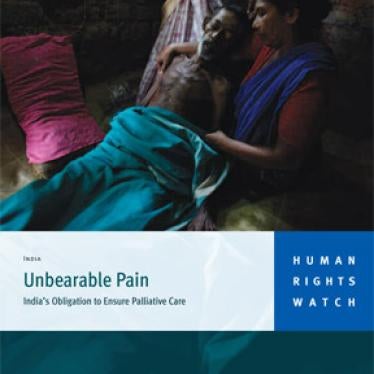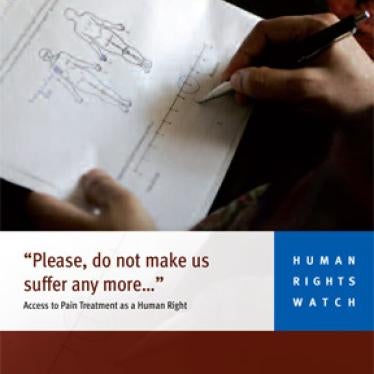(Tiruchirapalli) - India's government should act urgently to ensure access to pain medications, Human Rights Watch said ahead of a national conference on palliative care in Tiruchirapalli, Tamil Nadu.
Hundreds of thousands of Indian patients with cancer and other conditions experience agonizing pain every year because they do not have access to morphine - an inexpensive, safe, and highly effective pain medication. Government drug regulations, lack of training for health care workers, and poor integration of care are the core reasons for the lack of access, Human Rights Watch said.
"Each day the government fails to act, more than 2,000 cancer patients in India die in excruciating pain," said Diederik Lohman, senior health and human rights researcher at Human Rights Watch, who is to address the conference on February 13, 2010. "The government should take decisive action to end the unnecessary suffering."
In a 102-page report, "Unbearable Pain: India's Obligation to Ensure Palliative Care," published in October 2009, Human Rights Watch found that many major cancer hospitals in India do not provide patients with morphine, despite the fact that more than 70 percent of their patients are incurable and therefore more likely to require pain treatment and palliative care. Health centers offering services to people living with HIV similarly do not have morphine or doctors trained to prescribe it.
Severe pain is a common symptom among cancer patients, particularly during the last stages of the disease. An estimated more than one million advanced cancer patients in India experience severe pain every year. In addition, many other patients, including those with HIV, TB or other infections or illness, may face acute or chronic severe pain.
The report identified three key obstacles to improving pain treatment and palliative care:
- The failure to train doctors. Most doctors in India do not know how to assess or treat severe pain because the government does not include such instruction in relevant medical curricula.
- Poor integration of palliative care into health services. National cancer and AIDS control programs do not contain meaningful palliative care components, with the result that palliative care has second-tier status and does not receive adequate public funding.
- Restrictive drug regulations. Many Indian states have excessively strict narcotics regulations that make it very difficult for hospitals and pharmacies to get morphine. In 1998, the central government recommended that states adopt modified regulations, but more than half of India's states have not done so. Tamil Nadu enacted the modified regulations in 2002, removing a major barrier to pain treatment.
Following the release of the Human Rights Watch report, government officials promised to look into its findings. While some government agencies told Human Rights Watch that they would seek to remedy problems identified in the report, major policy changes have yet to take place.
India's international human rights obligations include ensuring that reasonable steps are taken to facilitate the development and integration of palliative care into existing health services. The denial of access to pain relief can result in a violation of the right to health, as well as of the strict prohibitions against torture and cruel, inhuman or degrading treatment, Human Rights Watch said.
According to Indian palliative care physicians, Tamil Nadu, the state hosting the palliative care conference, has made considerable progress improving availability of palliative care after reforming its drug regulations in 2002. Even so, many people in Tamil Nadu who need palliative care do not have access to it as training for healthcare providers remains insufficient. The majority of physicians in Tamil Nadu have not received any training in pain management or palliative care.
"Tamil Nadu's reform of drug regulations is an example for other states," Lohman will tell the conference. "The Tamil Nadu government should now take the next step and develop an action plan aimed at ensuring to everyone who needs palliative care has access to it."
Selected Quotes from Patients
"It felt as if someone was pricking me with needles. I just kept crying [throughout the night]. With that pain you think death is the only solution."
- Priya, Hyderabad, a woman with breast cancer
"My leg would burn like a chili on your tongue. The pain was so severe I felt like dying. I was very scared. I felt that it would be better to die than to have to bear this pain. [I thought] just remove the leg, then it will be alright. Just get rid of the leg so I'll be free of pain."
- Dilawar Joshi, Hyderabad, a Nepali man with a bone tumor
"I would sleep maybe an hour and a half per night. I could take any number of sleeping pills [without effect]. With morphine, I can relax. This place [the palliative care unit] is heaven-sent."
- Shruti Sharma, Hyderabad, a breast cancer patient
"I had pain in my back and both legs. My legs twisted into an abnormal position. My legs would turn inside and my toes up. It was a pricking pain that was excruciating. I could not sleep as the pain was particularly bad at night."
- Pillai, Trivandrum, a patient with spinal TB and HIV
"I developed severe pain all over the abdomen and in the area of my genitals. It was a continuous, throbbing pain that radiated to the back. It made me very irritable and frustrated. I went back to the doctor three or four times to say that I had pain and wasn't getting any relief. I would get new medicines but they would still provide no relief."
- Kamala Kanwar, Jaipur, patient with cervical cancer





